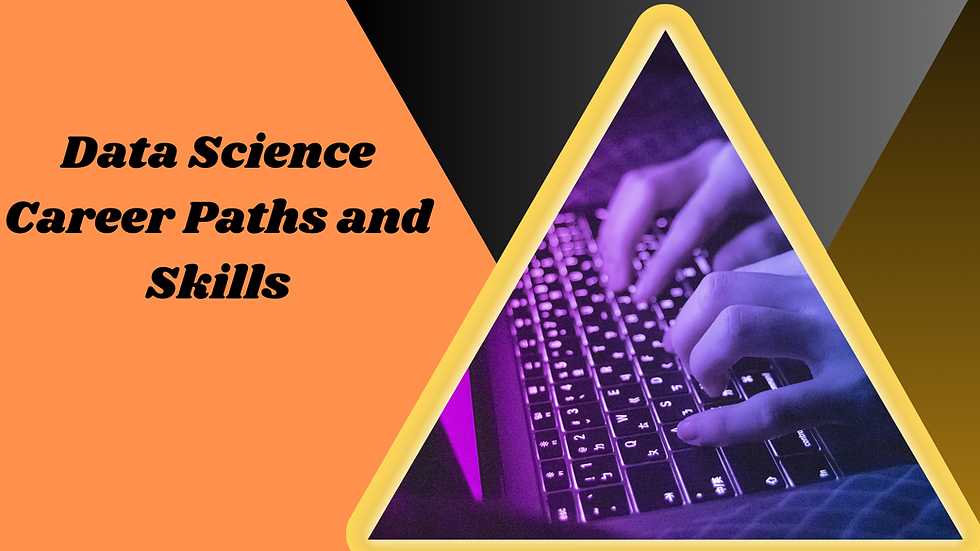Data Science Career Paths and Skills
- Vaishali pal

- May 17, 2024
- 4 min read

The need for qualified data scientists is growing across all businesses in today's data-driven society. From finance to healthcare, from retail to technology, organizations are leveraging data science to extract valuable insights and drive informed decision-making. However, embarking on a career in data science can feel like navigating a complex maze, with various paths and skill sets to consider. In this blog, we'll explore the diverse career paths available in data science and the essential skills needed to thrive in this dynamic field.
Understanding Data Science Career Paths
Data science encompasses a broad spectrum of roles, each requiring a unique set of skills and expertise. Here are some of the prominent career paths within the field:
Data Analyst: Data analysts focus on interpreting data to uncover trends, patterns, and insights that can inform business decisions. They utilize statistical techniques and data visualization tools to present their findings effectively.
Data Engineer: The infrastructure needed for data generation, storage, and processing must be planned, built, and maintained by data engineers. They work with big data technologies and programming languages to build robust data pipelines.
Machine Learning Engineer: Machine learning engineers specialize in developing algorithms and models that enable machines to learn from data and make predictions or decisions autonomously. They possess expertise in machine learning frameworks and programming languages like Python and R.
Data Scientist: Data scientists are interdisciplinary professionals who possess a blend of skills in statistics, programming, and domain knowledge. They leverage advanced analytics techniques to extract actionable insights from complex datasets and drive strategic initiatives.
AI Research Scientist: AI research scientists focus on pushing the boundaries of artificial intelligence through innovative research and experimentation. They often work on cutting-edge projects related to deep learning, natural language processing, and computer vision.
Business Intelligence (BI) Developer: BI developers design and implement business intelligence solutions that enable organizations to gather, store, and analyze data to facilitate decision-making at all levels. They utilize tools like Tableau, Power BI, and SQL for data visualization and reporting.
Data Science Manager/Director: Data science managers or directors oversee teams of data professionals, providing strategic direction and leadership to ensure the successful execution of data science projects. They collaborate with stakeholders to align data initiatives with business objectives.
Essential Skills for Data Science Success
Regardless of the chosen career path, certain skills are essential for success in the field of data science:
Programming: Proficiency in programming languages such as Python, R, and SQL is fundamental for data manipulation, analysis, and modeling. Python, in particular, is widely used in the data science community due to its versatility and extensive libraries for data manipulation (e.g., Pandas), machine learning (e.g., Scikit-learn), and deep learning (e.g., TensorFlow, PyTorch).
Statistics and Mathematics: A strong foundation in statistics and mathematics is crucial for understanding probabilistic concepts, hypothesis testing, and regression analysis. Knowledge of calculus, linear algebra, and probability theory is invaluable for developing and evaluating machine learning models.
Data Wrangling: Data wrangling involves cleaning, transforming, and preprocessing raw data to make it suitable for analysis. Data scientists spend a significant amount of time on this task, so proficiency in data wrangling techniques and tools (e.g., Pandas, dplyr) is essential.
Machine Learning Algorithms: Data scientists must have a deep understanding of various machine learning algorithms and techniques, including supervised learning, unsupervised learning, and reinforcement learning. They should know how to select the appropriate algorithm for a given task and fine-tune its parameters for optimal performance.
Data Visualization: One of the most important parts of data science is successfully communicating insights. Data scientists should be proficient in data visualization techniques and tools (e.g., Matplotlib, Seaborn, ggplot2) to create compelling visualizations that convey complex information in a clear and intuitive manner.
Domain Knowledge: Domain knowledge refers to expertise in a specific industry or subject area. Data scientists who understand the nuances of the domain they're working in can ask better questions, identify relevant variables, and generate more meaningful insights.
Communication Skills: Data scientists must be able to communicate their findings and recommendations to non-technical stakeholders effectively. Strong written and verbal communication skills are essential for presenting complex technical concepts in a way that is understandable and actionable.
Continuous Learning: The field of data science is constantly evolving, with new techniques, algorithms, and tools emerging regularly. Data scientists must be committed to lifelong learning, staying updated on the latest advancements and continuously improving their skills.
Conclusion
In conclusion, data science offers a multitude of career paths, each requiring a unique combination of skills and expertise. Whether you aspire to be a data analyst, data engineer, machine learning engineer, or data scientist, acquiring proficiency in programming, statistics, machine learning, data wrangling, and communication is essential for success in the field. By continuously honing your skills and staying abreast of industry trends, you can navigate the maze of data science career paths and embark on a fulfilling and rewarding professional journey. For those seeking the best Data Science Training in Noida, Delhi, Mumbai, Vadodara & all other cities in India, it's crucial to research institutes that offer comprehensive programs covering the aforementioned skill sets, providing hands-on experience and real-world projects to enhance learning and prepare for the demands of the industry.


